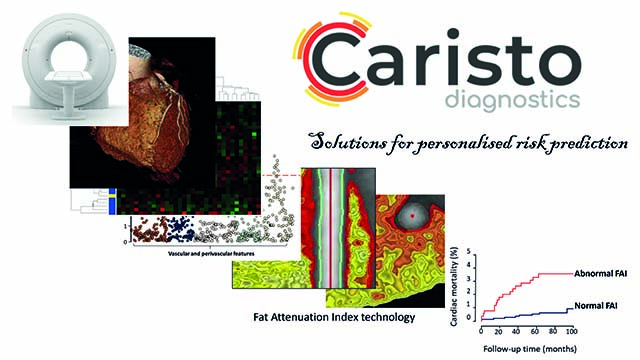 Caristo Diagnostics, an Oxford University spinout company, has been launched to commercialise a new coronary CT image analysis technology that can identify patients at risk of fatal myocardial infarction years before they occur. Caristo’s technology, which has been developed as part of a research collaboration led by Oxford University, is based on the novel scientific discovery that the fat tissue surrounding the coronary arteries senses the presence of inflammation in the coronary artery.
Caristo Diagnostics, an Oxford University spinout company, has been launched to commercialise a new coronary CT image analysis technology that can identify patients at risk of fatal myocardial infarction years before they occur. Caristo’s technology, which has been developed as part of a research collaboration led by Oxford University, is based on the novel scientific discovery that the fat tissue surrounding the coronary arteries senses the presence of inflammation in the coronary artery.
A press release reports that this change can be detected by analysis of routine coronary computed tomography (CT) angiograms using Caristo’s proprietary technology, producing a new measure called the “fat attenuation index” (FAI), which accurately quantifies the extent of inflammation in the coronary arteries supplying the heart.
The FAI can be combined with other known risk factors and imaging characteristics to create a new Cardiac Risk score (CaRi), which provides a greater level of prognostic insight compared to any existing risk-assessment biomarker. With Caristo’s technology, the press release states, clinicians would be able to identify early those people who are at risk of having a heart attack and take preventative steps, such as lifestyle modification and initiating preventive medication, before it strikes.
Caristo’s technology is hardware agnostic and can be assessed on any standard CT angiogram. This includes existing CT angiograms, giving clinicians the opportunity to re-evaluate a patient’s future risk of having a myocardial infarction. By offering the technology on a SaaS basis, the technology can be deployed into hospitals without any changes to hospital infrastructure. This new technology can be used by healthcare providers and the biopharmaceutical industry, as a companion diagnostic to guide deployment of treatments in primary and secondary prevention.
The company’s launch comes shortly after a study into FAI, which is based on analysis of over 3,900 patients in both Europe and the USA and includes follow-up data for up to a decade, was published in the Lancet in August 2018.
Caristo Diagnostics has raised £2m in seed financing, in a round backed by a consortium of investors, including Oxford Technology Investment Fund, Longwall Ventures and Oxford Sciences Innovation. The development and launch of Caristo has been supported by Oxford University Innovation. The underpinning research into FAI was conducted collaboratively with partners including the Cleveland Clinic and the University of Erlangen and funded in part by the British Heart Foundation. The funding will be used together with a recently awarded Innovate UK grant for £1.9m, to further develop and then deploy Caristo’s underpinning technology.
Charalambos Antoniades (Oxford University, Oxford, UK), founder of Caristo Diagnostics, says: “This new technology may prove transformative for primary and secondary prevention. For the first time we have a set of biomarkers, derived from a routine test used anyway as part of everyday clinical practice, that measures what we call ‘the residual cardiovascular risk’, currently missed by all risk scores and non-invasive tests. Knowing who is at high risk for a heart attack, could allow us to intervene early enough to prevent it. I expect these biomarkers to become essential part of standard coronary CT angiography reporting in the coming years.”










